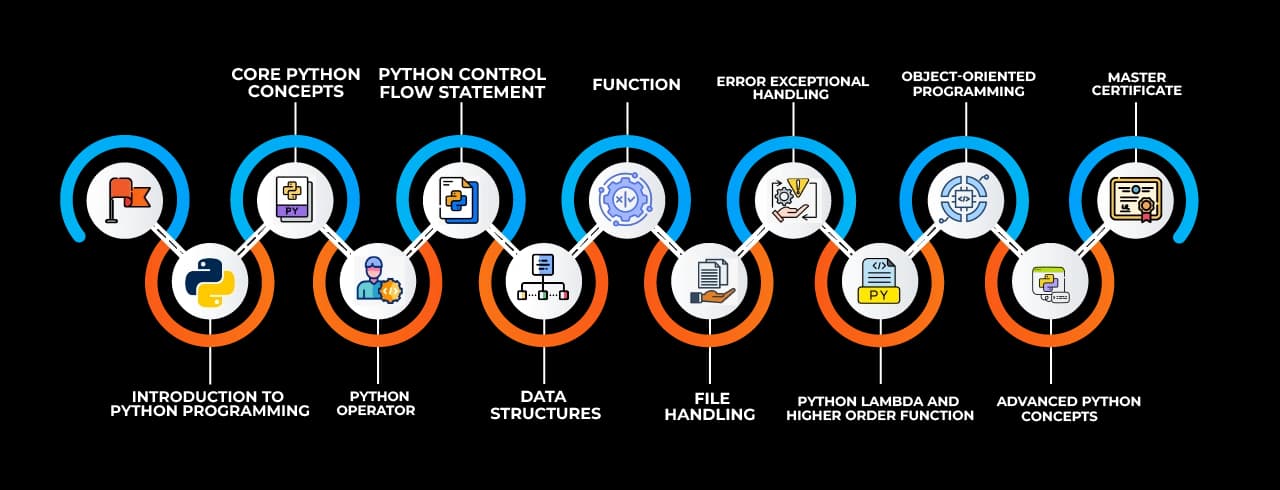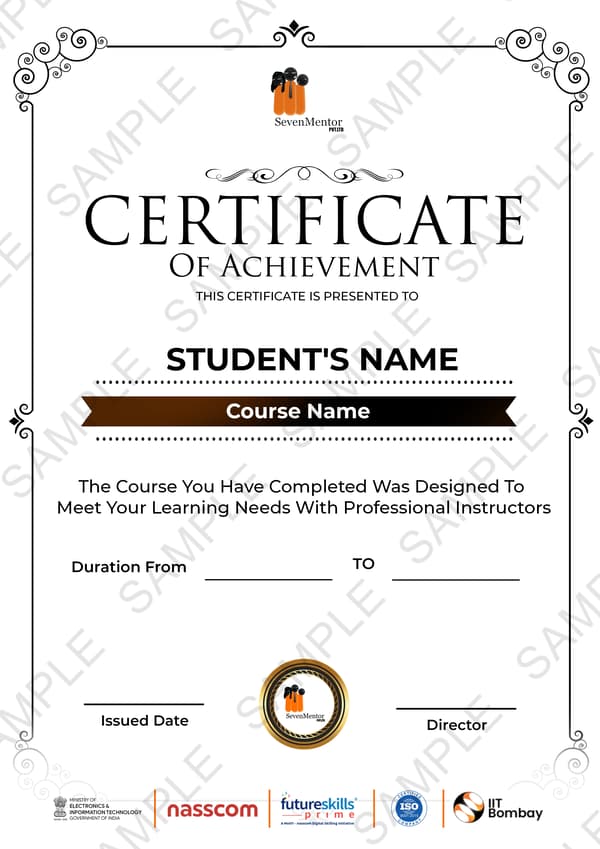Python Course in Australia
 Master Python with Hands-On Training from Industry Experts
Master Python with Hands-On Training from Industry Experts Accelerate Your Career with SevenMentor’s Real-World Python Expertise
Accelerate Your Career with SevenMentor’s Real-World Python Expertise Build Scalable and Efficient Solutions by Gaining In-Demand Python Skills
Build Scalable and Efficient Solutions by Gaining In-Demand Python SkillsStart Today!
CONSULT WITH
OUR ADVISORS
- Course & Curriculum Details
- Flexible Learning Options
- Affordable Learning
- Enrollment Process
- Career Guidance
- Internship Opportunities
- General Communication
- Certification Benefits
Learning Curve for Python

Master In Python Course
OneCourseMultipleRoles
Empower your career with in-demand data skills and open doors to top-tier opportunities.
Skills & Tools You'll Learn -
Why Choose SevenMentor Python
Empowering Careers with Industry-Ready Skills.
Specialized Pocket Friendly Programs as per your requirements
Live Projects With Hands-on Experience
Corporate Soft-skills & Personality Building Sessions
Digital Online, Classroom, Hybrid Batches
Interview Calls Assistance & Mock Sessions
1:1 Mentorship when required
Industry Experienced Trainers
Class Recordings for Missed Classes
1 Year FREE Repeat Option
Bonus Resources
Specialized Pocket Friendly Programs as per your requirements
Live Projects With Hands-on Experience
Corporate Soft-skills & Personality Building Sessions
Digital Online, Classroom, Hybrid Batches
Interview Calls Assistance & Mock Sessions
1:1 Mentorship when required
Industry Experienced Trainers
Class Recordings for Missed Classes
1 Year FREE Repeat Option
Bonus Resources
Fastest 1:1 doubt support
Flexible EMI Plans
Adaptive LMS
Free Wifi Facilities
Flexible Scheduling
Ongoing Career Support
Placement Drives
GitHub Project Implementations
Real World Topics
5/5 rating for 99% doubt Solutions
Be Different With Master Certificate
Latest Market Technology & Practical Training
Resume Building Session & Job Portals Training
Enhanced Capstone Projects for learning
Stand Out with an impressive Certificate
Weekday and Weekend Batches
Workshops & Seminars with Industry Experts
Unlimited Interview Calls
AWS Cloud Project Deployments
Live Quizzes
Resolve doubts any time through chat, voice notes, calling or meeting with instructors.
Curriculum For Python
BATCH SCHEDULE
Python Course
Find Your Perfect Training Session
Feb 1 - Feb 7
2 sessionsFeb 8 - Feb 14
1 sessionsFeb 15 - Feb 21
1 sessionsLearning Comes Alive Through Hands-On PROJECTS!
Comprehensive Training Programs Designed to Elevate Your Career
No active project selected.
Transform Your Future with Elite Certification
Add Our Training Certificate In Your LinkedIn Profile
Our industry-relevant certification equips you with essential skills required to succeed in a highly dynamic job market.
Join us and be part of over 50,000 successful certified graduates.

KEY Features that Makes Us Better and Best FIT For You
Expert Trainers
Industry professionals with extensive experience to guide your learning journey.
Comprehensive Curriculum
In-depth courses designed to meet current industry standards and trends.
Hands-on Training
Real-world projects and practical sessions to enhance learning outcomes.
Flexible Schedules
Options for weekday, weekend, and online batches to suit your convenience.
Industry-Recognized Certifications
Globally accepted credentials to boost your career prospects.
State-of-the-Art Infrastructure
Modern facilities and tools for an engaging learning experience.
100% Placement Assistance
Dedicated support to help you secure your dream job.
Affordable Fees
Quality training at competitive prices with flexible payment options.
Lifetime Access to Learning Materials
Revisit course content anytime for continuous learning.
Personalized Attention
Small batch sizes for individualized mentoring and guidance.
Diverse Course Offerings
A wide range of programs in IT, business, design, and more.
Course Content
Frequently Asked Questions
Everything you need to know about our revolutionary job platform
Will SevenMentor provide me with study resources for the Python course?
What job options are available to me once I finish the Python course?
Does this Python course require in-person attendance, or is it offered online?
Are there any assignments that are practical based in this Python course?
How does Python certification enhance my career progression?
Are there any prerequisites for enrolling in a SevenMentor Institute Python course?
What sets SevenMentor apart as an excellent option for Python training?
What is the duration of the Python course?
Does SevenMentor provide job placement assistance after completing the Python course?
Which tools and technologies will I learn during this Python course?
What teaching approach does SevenMentor use for their Python training?
Does this Python course include advanced topics, or is it strictly for beginners?
What are the benefits of taking Python training at SevenMentor compared to self-learning?
Explore Other Demanding Courses
No demanding courses available at the moment.
Debug: courses prop type: object, isArray: yes, length: 0



